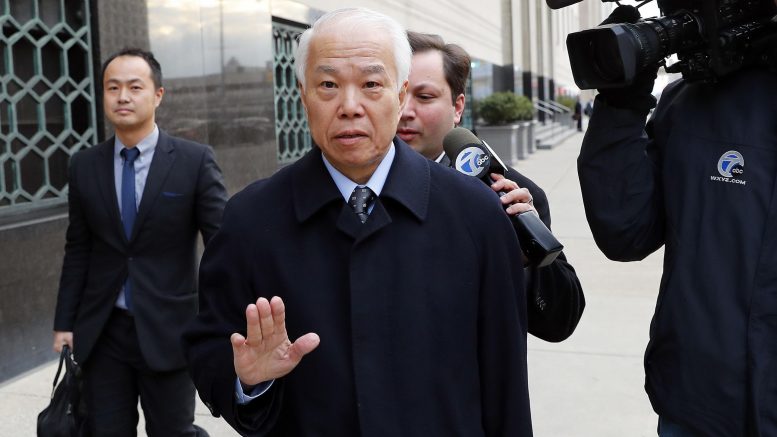“Destruction of the company would be appropriate, but the interest of the victims and the (automakers who bought air bags) dictates we do the best we can without destroying the corporation,” Steeh said.
In addition to the $25 million fine, the plea agreement stipulates that $125 million will go to the injured and families of those killed who haven’t reached separate settlements; $850 million will be made available to automakers for air bag recall and replacement costs.
Takata’s chief financial officer Yoichiro Nomura appeared in Detroit to make the plea on the company’s behalf.
Nomura said he deeply regrets the circumstances that led the company to be in court and called the conduct by the company “unacceptable and inconsistent” with its business practices.
“The company takes the matter seriously,” Nomura said. “We are dedicated to ensuring this never happens again.”
Steeh decided to sentence the company immediately after the plea on Monday, placing the company on three years of probation and ordering the fines and restitution be paid on a timeline.
A court-appointed special master will oversee administration of the $975 million in restitution funds. Steeh said he will make a decision later this week on which special master will oversee the compensation fund.
Takata’s air bag inflators can explode with too much force, hurling shrapnel into drivers and passengers. The inflators are blamed for at least 16 deaths worldwide and more than 180 injuries. The problem touched off the largest automotive recall in U.S. history involving 42 million vehicles and 60 million inflators.
Unlike most other air bag makers, Takata uses the explosive chemical ammonium nitrate to inflate air bags instantly in a crash. But the chemical can deteriorate when exposed to prolonged airborne moisture.
In a separate federal court in Miami on Monday, lawyers for victims and their families suing Takata and five automakers – Honda, Toyota, Nissan, Ford and BMW – allege the car companies knew Takata’s air bags were dangerous, yet continued to use them for years they were inexpensive.
“They were focused on the low price of Takata’s inflators and concerned that if they stopped using (them), they might not have a sufficient supply, which would prevent them from selling vehicles and generating billions of dollars in revenue,” a status report filed Monday in Miami by lead plaintiff attorney Peter Prieto said.
In the court filing, Prieto cited specific examples of evidence from the automakers, including an allegation that Ford chose Takata’s inflators over the objections of Ford’s own inflator expert.
The Miami court is handling dozens of lawsuits against Takata and the automakers. The filing says the allegations are partly based on auto company emails and internal documents.
Earlier, the automakers had contended that Takata was the problem because it admitted to covering up the defective inflators. In the court filing, plaintiffs lawyers allege that the automakers were “far from innocent” in the case, and that they had independent knowledge that Takata’s air bag inflators were unsafe before putting them in millions of vehicles.
“The automotive defendants were aware that rupture after rupture, both during testing and in the field, confirmed how dangerous and defective Takata’s air bags were,” the attorneys allege in the court document, called a “status report.”
Messages were left Monday morning for all five automakers.
Ford said it would respond to the pending litigation through the “appropriate legal channels.”
Toyota declined to comment.
Honda, in a statement, called the plaintiffs’ filing “misleading.”
“The reality is that when Honda learned of the risks that these air bag inflators presented, Honda reacted promptly and appropriately by issuing safety recalls and replacing the affected Takata air bag inflators at no charge to its customers,” the Japanese automaker said.
Honda also said that the suggestion it chose to use Takata air bag inflators because they were less expensive than competitors’ is “categorically false.”
“When Honda installed Takata’s air bag modules in its vehicles, Honda reasonably believed, based on extensive test results provided by Takata, that they were safe,” the automaker said.
Three former Takata executives have been indicted on wire fraud charges. The indictments are part of a criminal resolution between U.S. regulators and the company.
Takata has agreed to implement rigorous internal controls, retain a compliance monitor for three years and cooperate fully with the department’s ongoing investigation.
Closure with the Justice Department after a 25-month international investigation wraps up the criminal portion of Takata’s auto safety recall, which was the largest in history, and allows it to proceed with its hunt for a buyer.
The Associated Press contributed and Detroit News staff writer Melissa Burden contributed.
Source: www.detroitnews.com




